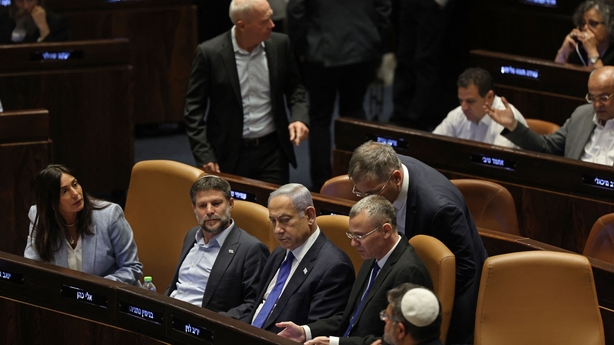Israel's Prime Minister has said that he hopes his coalition government will reach an agreement with the opposition on a controversial overhaul of the judiciary by the end of November.
In televised remarks, Benyamin Netanyahu insisted that the courts would remain independent.
Today, his hard-right government pushed through a key component of the package despite months of mass protests and concerns voiced by Israel's key ally, the US.
The bill voted through today will curb the ability of the Supreme Court to strike down government decisions by abolishing the "reasonableness" clause.
In the 120-seat Knesset, the government won the vote by 64-0, after opposition parliamentarians abandoned the chamber in protest, some of them shouting, "Shame! Shame!".
Critics charge that the judicial revamp could open the way to more authoritarian government by removing checks and balances on the Israeli executive.
Netanyahu's coalition government, which includes far-right and ultra-Orthodox Jewish parties, argues that the proposed changes are needed to ensure a better balance of power..

Police used water cannon to disperse demonstrators opposed to the reforms, which have triggered one of the biggest protest movements in Israel's history since thy were unveiled in January.
The crisis has spread to the military, with protest leaders saying that thousands of volunteer reservists would not report for duty if the government continues with the plans, and former top brass warning that Israel's war-readiness could be at risk.
The head of Israel's Israel's General Federation of Labour will meet other union officials to discuss the possibility of declaring a general strike.
Arnon Bar-David, chairman of the Histadrut, has been trying to mediate between the government and opposition.
"From this moment on, any unilateral progress in the reform will have serious consequences", he said. "Either things will progress with broad agreement or they will not progress at all."

Meanwhile, an Israeli political watchdog group said it would file a Supreme Court appeal against the new amended law.
The Movement for Quality Government in Israel said it would argue that the amendment was a de-facto elimination of the judicial branch and should be overturned by the court
Read More: What are Israel's controversial judicial overhaul plans?
The government announced its plans to change the judiciary in January soon after it was sworn in, setting off unprecedented street protests, stirring concern among allies abroad for Israel's democratic health and denting the economy.
The Shekel has weakened around 8% since.
Israel's two biggest banks, Leumi and Hapoalim, said they would allow workers to demonstrate without losing pay.
A forum of some 150 of Israel's largest companies went on strike and Azrieli and Big, two of Israel's largest malls, said stores in their shopping centres would remain closed.

